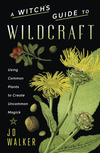Weeds: 10 Magickal Resources You Can Find in Your Own Backyard

There is a saying in the gardening community: Grow where you're planted. It means to do your best to develop, grow, and yes, even bloom, regardless of your situation or circumstance.
I like to use this same philosophy when it comes to my spiritual and magickal work. I use store-bought things, and am very happy to have access to them. However, I want my religious tradition to be more than something I buy online or do on one of the eight Sabbats.
I want to see magick in the world around me. So, I often look for supplies right outside my door.
"But," you say, "I don’t have a yard or a garden. Where am I supposed to look for herbs?"
Right under foot, dearie.
I wrote A Witch's Guide to Wildcraft to help folks understand that they can fill a lot of their needs simply by looking at the world around them with new eyes.
Practically every residence, whether apartment complex, rental property, or house, has a yard. Take a look at that grassy expanse. You'll quickly see that it's not all grass. In the case of most dwelling spaces with an accompanying yard, it's not even mostly grass. It is, however, a wonderful shopping space for magickal supplies. For example:
- Chickweed: This low-growing, fresh green, matting plant is called Stellaria media because of the tiny little star-like flowers it produces. It is a moon herb, good for lunar magick as well as for spells to attract or keep a lover. It can also be used in beauty spells.
- Clover: Everyone knows clover (Trifolium repens) is a good luck herb. It is also used in magick for prosperity.
- Onions: Wild onions (Allium canadense) are the bane of any homeowner who takes pride in his or her lawn. But witches use them for exorcism and protection.
- Dandelion: You know you've wished on a dandelion (Taraxacum officinale) puff ball before! Children everywhere do. Blowing on the puff ball is also said to divine everything from how long you will live to the direction from which your true love will come. It is a good resource for any ritual work done to honor solar deities.
- Violets: Violas or violets, on the other hand, can be used in workings with Venus, Aphrodite, Inanna, or any deity associated with love. I find it invaluable in mending a broken heart.
- Grass: Even the grass that is growing in the lawn or the ornamental grasses gracing the landscape border or perennial flower beds have magickal uses. Gather what you need for protection and prosperity or use a handful to make a natural, temporary asperging wand.
Broaden your view and take in the plants that border the yard or that live in the landscape.
- Hollies: Don't throw away those clippings from the hollies in the shrub border, even the ornamental Japanese hollies (Illex cornuta, I. crenata, etc.). They can be used for protection spells.
- Honeysuckle: Look into that shrub border for the Japanese honeysuckle (Lonicera japonica) that has probably snuck in there. It can be used in prosperity and binding spells. With a long enough piece of vine, you can make a wreath to hang on the door or above the altar to attract that prosperity.
- Ivy: Another common vine is ivy (Hedera). This is a witchy herb if there ever was one. It is a Saturn herb but is also considered feminine in energy. Like all vines, it can be used in binding magick. Ivy has the added benefit of being used for protection and healing.
- Moss: Even the moss (Bryophyta) that grows along the foundation of a residence or in the shade of a tree has magickal uses. Properly dried, it is a filling for a poppet. Fairies are said to love it, so use it to dress your fairy garden.
Without leaving your immediate area, you've found supplies for everything from spell work to ritual tools. When you respectfully gather your own herbs for your workings, you are connecting with the Divine, however you perceive the Divine. You are one with the Universe. You are a self-sufficient, enterprising Pagan who can stand on your own, regardless of where you are planted.

About JD Walker
Related Products

is subject to certain Terms and Conditions